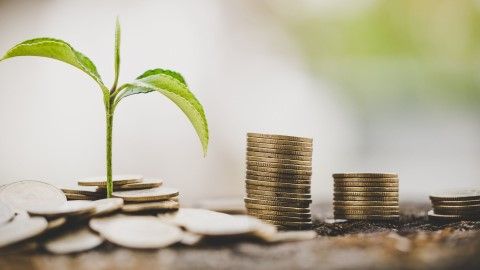3 Reasons Why Sustainable Banking is Here to Stay
Sustainable finance – and the role that banks play – has gained momentum in recent years, emerging as a key catalyst in transitioning to a clean-energy economy.

Sustainable finance – and the role that banks play – has gained momentum in recent years, emerging as a key catalyst in transitioning to a clean-energy economy.
Ask most people to define “sustainable finance” a decade ago and one would have gotten wildly different answers. But as stakeholders coalesce around the relationship between the environmental impact of businesses and the financing that banks and lenders provide to those businesses, the idea of sustainable finance has gone from a little-known topic to one that is providing significant financial benefits while protecting our climate for future generations to come.
As a bank, we think about sustainability across three key pillars:
First, by focusing on driving progress through sustainable finance. Today, nearly a third of our portfolio directly funds clean energy and sustainable oriented projects. We finance millions in residential solar loans, green building upgrades, affordable housing and accessible healthcare.
Second, integrating sustainable practices into our business. This means our approach to sustainability runs throughout our operations, from increasing our LEED© certified square footage to maintaining carbon neutrality in our operational footprint.
Third, supporting our communities: we continue to establish purposeful and impactful community partnerships, from tripling our corporate giving last year to increasing our supplier spend to diverse and small businesses.
As sustainability becomes increasingly top of mind for individuals, companies & investors, here are 3 reasons the shift towards sustainable finance will be with us for the foreseeable future:
1. A huge and growing amount of consumer interest.
As consumers increasingly choose to align their spending and financial investments with socially and environmentally conscious brands, businesses that adopt sustainability measures in their overall approach become more attractive financing opportunities. According to a 2021 PwC study, 80% of consumers are more likely to buy from a company with environmental commitments, while a recent NielsenIQ study found 78% of US consumers stated a sustainable lifestyle is important to them.
2. The renewable energy market continues to expand dramatically.
In 2021, renewable electricity generation rose by almost 7%, with wind and solar PV technologies accounting for almost 90% of growth, and in 2022, electricity generated from renewables surpassed coal in the United States. Meanwhile, countries that act as the largest contributors to fossil fuels such as India are forecasted to double new installations of renewable energy sources over the next five years, compared to 2015-2020. This expansion means a huge financing opportunity across the renewable energy ecosystem.
3. For the environment, businesses, and investors, it's a win, win, win.
In addition to the benefits to the planet, companies that embrace sustainability and incorporate it into their business are better positioned to manage the risks of an ever-growing and evolving marketplace in the face of climate change. In fact, stock funds weighted toward positive environmental, social, and governance scores outperformed across global markets over the past five years. We believe focusing on financing this segment of companies leads to better credit outcomes over the long-term.
Far from being a trend, sustainable finance has become a powerful mechanism for driving positive change in our world. Integrating sustainability into decision-making and long-term strategy not only promotes stewardship and social responsibility, it also happens to be good for business and therefore good for investors.
As we navigate the challenges of climate change and keep working towards a more sustainable future, a collective responsibility will be required from individuals, businesses, governments, and capital providers to channel resources towards projects that prioritize a sustainable economy, and build a better, greener world for the generations that follow.
Forbright Bank is an Equal Housing Lender. Member FDIC. For more information, visit ForbrightBank.com.






